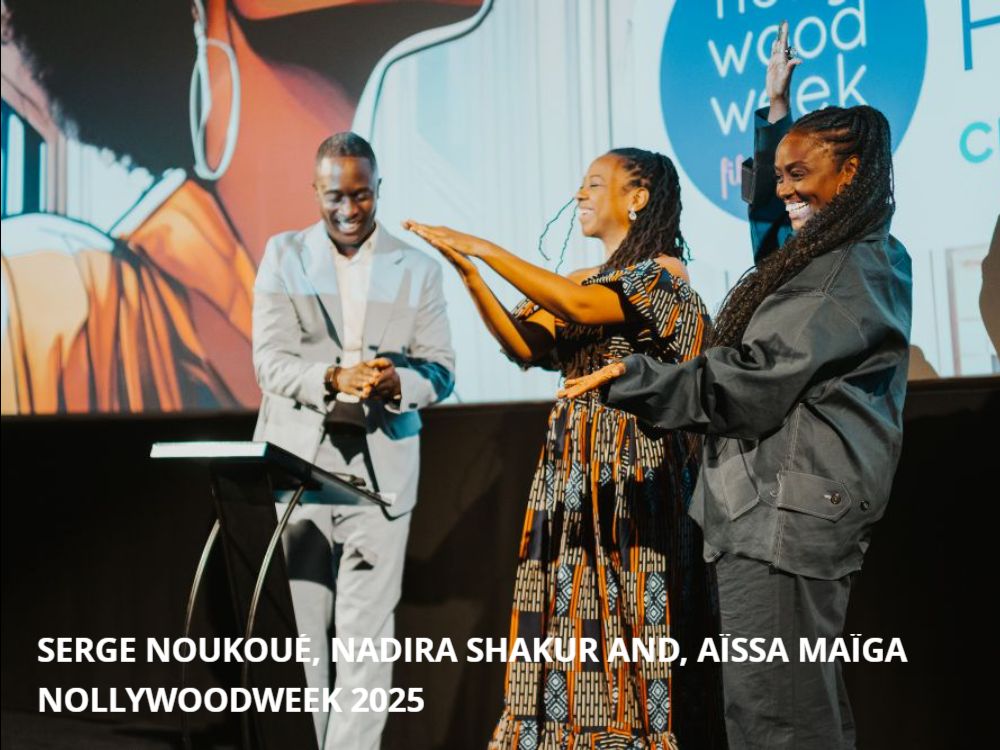Prefer to listen? This newsletter is now available in AI-generated audio format.
Twelve years into its journey, NollywoodWeek—co-founded by Serge Noukoué and Nadira Shakur—continues to hold space for African and diaspora cinema in one of the world’s most symbolically loaded cultural capitals. As one of the few Black-led film festivals in Paris—and one that does not rely on French public arts funding—it operates outside the usual institutional channels. That independence has shaped its identity, for better and for harder.
In 2025, African Film Press (AFP) formally joined as a media partner for the first time, in what we framed as a minimal and thoughtful agreement designed to test alignment. Represented by Akoroko and What Kept Me Up on the ground, and Sinema Focus remotely, AFP’s goal wasn’t to cover everything or insert ourselves into operations.

The intent was simple: contribute meaningfully across our editorial strengths, observe, and reflect honestly on what this kind of partnership could—or should—look like going forward.
The 2025 edition featured world premieres, politically urgent selections, cross-regional shorts, and a festival circuit world premiere standout in Adekunle Adejuyigbe’s “Olùmòtàn: Stories We Are Not Supposed to Tell” as closing night. But like many independent cultural events contending with post-COVID realities, compressed timelines and resource constraints shaped what could be executed, and what could be contextualized.
One shared takeaway was the need—and not just for NollywoodWeek and AFP—to give audiences clearer entry points into the work, especially when films come from places with different political histories, industry contexts, or cinematic conventions. A title that resonates in one country may be unfamiliar elsewhere. That makes context and framing, before, during, and after the screening, all the more critical.
For AFP, this was a first: a formal public-facing partnership with a longstanding festival operating in a region (Paris, France, and broader Europe) where none of our platforms are officially based, or have broad presence outside of anglophone localities. That comes with both opportunity and limitation. We didn’t catch everything. We didn’t always know where to look. But that unfamiliarity is also what makes the collaboration valuable. It challenges assumptions, tests our editorial flexibility, and invites us to rethink how African festivals and African media define each other in real time.
Key to that process of definition in our context, as its name suggests, NollywoodWeek has long positioned itself as a corrective to the way Nigerian popular cinema is framed (or ignored) in international spaces.
But the ecosystem has shifted, and the festival as a result. What began as a clear response to Nollywood’s marginalization in Francophone cultural spaces is now also engaging with filmmakers from Kenya, Cameroon, South Africa, Benin, the United States, and more.
The question isn’t whether the festival is expanding—it is—but what language, curation, and communication strategies can support that expansion while keeping its identity clear and consistent, ensuring little hesitation from any target areas to see themselves reflected.

Whatever the path forward, it’s an opportunity. The specificity of the festival’s name, should it not change, doesn’t need to be limiting. It can help frame it as a site of conversation. What is Nollywood today? What is its influence? What does it mean to borrow from its energy or its commerciality while working elsewhere?
For Noukoué and Shakur, NollywoodWeek has always been more than a screening space; it’s a platform. That sensibility is still evolving, and still needed.
For our part, AFP sees this first engagement as a start. Going forward, we’re thinking more critically about how we, as a still-evolving media alliance, engage with African film festivals at home and abroad. How we prepare. How we cover. What kind of framing actually serves the festivals, filmmakers, and audiences. And how to be flexible in anticipation of the unexpected.
As Noukoué put it in our post-festival conversation, “We’re still here because people don’t have access to these films anywhere else.” That continues to be fundamental to their operational logic, no matter what comes next.
This post-mortem is part of that process—essentially, a way to take stock, clarify intent, and set the stage for how we might move forward.
NollywoodWeek 2025 is behind us. The 2026 edition is already in motion. The work and the alignment are ongoing…
For detailed reviews, interviews, and more reporting from the 2025 edition, visit What Kept Me Up’s NollywoodWeek coverage—one of the most complete public records of this year’s festival.
helloI like your writing very so much proportion we keep up a correspondence extra approximately your post on AOL I need an expert in this space to unravel my problem May be that is you Taking a look forward to see you